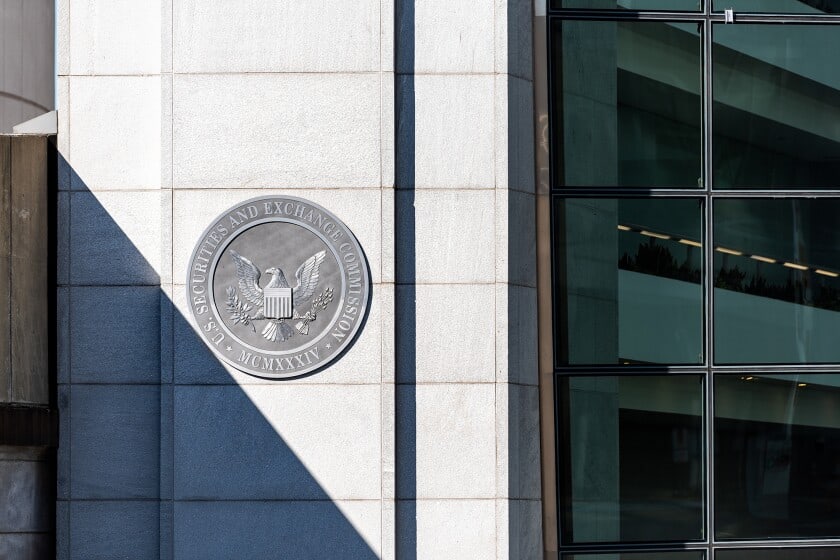
A panel of activism experts on June 2 debated the impact of a new Securities and Exchange Commission rule for director fights, with one adviser suggesting it could open the floodgates for activism campaigns.
“This is the most dramatic rule changes that the SEC has adopted in 30 years on proxy contests,” Sidley Austin LLP partner Kai Liekefett told The Deal Economy conference.
At issue is a rule adopted in November set to take effect Sept. 1 to create a universal proxy card for contests. The provision will give institutional investors more flexibility to pick and choose incumbent and dissident director candidates on one card.
The rule allows investors to receive one proxy card including all incumbent and activist director candidates, in both change-of-control and minority slate contests, a major change from the current system where investors voting remotely — as most institutional investors do — must vote on either an incumbent or dissident card.
Liekefett, who advises companies targeted by activists, said he was surprised that corporate America didn’t complain more about universal proxy cards, after it heavily criticized a broad investor initiative to set up “proxy access” at corporations, which typically allows an investor group with a 3% stake for three years to nominate directors on company proxy cards. Between 2015 and 2019, hundreds of mostly larger companies adopted proxy access, though it has rarely been employed by shareholders since.
“It is mindboggling that corporate America went to war on proxy access when everybody on this panel realized it was a complete nothing burger,” Liekefett said. “America was completely silent when the universal proxy card was adopted.”
Liekefett argued that the 3% for three years condition was a burden that was “way too high” to drive shareholder nominations. He argued, however, that universal proxy cards will allow an investor owning “one share for one minute” to nominate a control slate at Microsoft Corp. (MSFT) or Apple Inc. (AAPL). “It makes it extraordinarily easy to get anybody on the company’s ballot,” Liekefett said.
Patrick McHugh, a founder and senior managing director at proxy solicitor Okapi Partners LLC, pushed back, though, on Liekefett’s expectation that the rule will open the floodgates to activism. He said that to win a contest, an activist needs advisers and investment solicitors.
“I’m not sure if I am as terrified for corporate America as Kai is. If [activists] aren’t properly advised, they aren’t going to get anywhere,” McHugh said. “Serious activists are properly advised. There are a handful of law firms that know how to do this and a smaller group of solicitors that tend to focus on these campaigns.”
In an effort to ensure that activists launching director contests are serious, the rule requires investors to solicit at least 67% of shares to qualify for use of the card. Liekefett argued, however, that an investor may only need to solicit 20 or so investors to meet that threshold as “corporate America is so highly concentrated.”
He said that investors with little experience can file a “bare-bones” proxy statement, adding that the SEC’s “notice and access” rules allow an activist investor to send investors a postcard with a link to the proxy statement, while many larger investors accept electronic proxies, so no mailing is necessary.
Currently, corporations and activists can mutually agree to set up universal proxy cards, but they rarely come to a meeting of the minds on the issue.
Jonathan Duskin, founder of Macellum Advisors GP LLC, an activist fund with just under $500 million in assets, said on the panel he knows universal cards will be helpful because over the past seven years he has asked companies to let him submit one and they never agreed.
“I have been told no, twice by Kai in fact, despite owning 1.5% to 10% of various companies” Duskin said.
Duskin added that with the outgoing system, institutions have often been fearful that if they vote on the activist card there will be an unintended consequence of giving the investor more than they deserve because they also may withhold votes on some incumbent company directors. “All that goes away, and shareholders can vote for who they want,” he said.
He said activists can only succeed in their contests if they make a compelling argument.
“The brilliance of the American proxy system is that investors have a say in the way companies are run,” Duskin said. “If other shareholders agree with that argument, that should hold some sway.”
McHugh said it was possible that some bigger passive index fund managers — which typically vote for incumbent directors in most contests — may be more likely to support a subset of the dissident slate of directors in a universal proxy card system.
Editor’s note: The original version of this article was published earlier on The Deal’s premium subscription website. For access, log in to TheDeal.com or use the form below to request a free trial.



